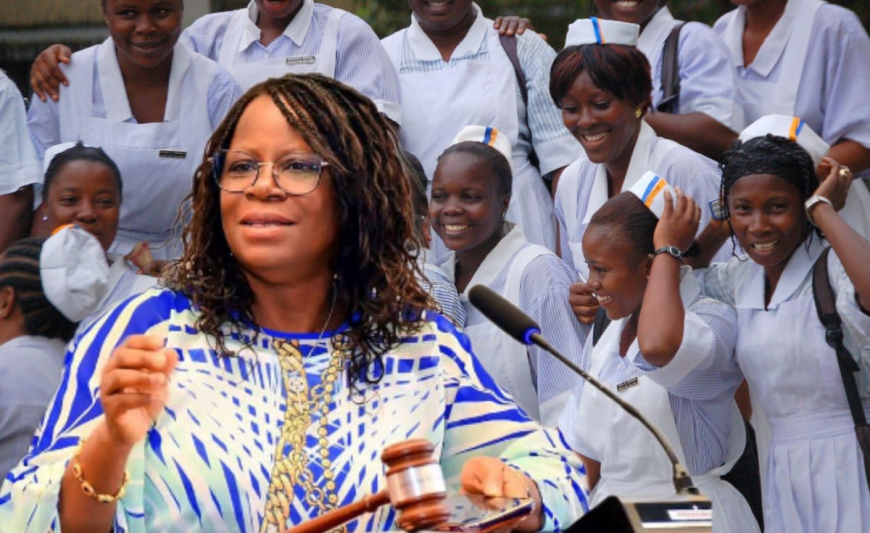Senate Pro-Temp Blasts Health Ministry Over 9,000 Unpaid Workers, Demands Replacement for Retired Specialists

MONROVIA, LIBERIA: Amid growing unrest over unpaid and poorly treated health workers, Senate Pro Tempore Nyonblee Karnga-Lawrence has categorically condemned the Ministry of Health (MOH) and the Civil Service Agency (CSA), warning that Liberia’s health sector is on the verge of collapse due to the reckless mishandling of voluntary health workers.
~Abraham Sylvester Panto
Speaking before Senate plenary on Thursday March 20, of this year, Senator Karnga-Lawrence criticized the government’s failure to compensate over 9,000 voluntary health workers, many of whom have served for years without pay. She also raised alarms about the Ministry of Health’s decision to retire specialists without securing replacements, calling it a move that will create dangerous deficiencies in the already struggling healthcare system.
"How does a government expect to run a functional health system when it is retiring skilled specialists without replacements and refusing to pay the very workers who are holding the system together?" she questioned.
Her remarks came during a heated Senate session where top officials from MOH and CSA appeared to explain the prolonged delay in placing voluntary health workers on payroll. The officials, however, failed to provide a concrete timeline or justification for the neglect, only citing budgetary constraints.
"We see money being allocated for ghost projects, unnecessary foreign trips, and bloated government salaries, yet we are told there is no budget for healthcare workers who are actually saving lives?" she retorted, calling the situation a national disgrace.
According to a report, in Grand Bassa County, voluntary nurse Josephine Wesseh, age 43, has spent over six years delivering babies, treating malaria, and providing essential care in remote areas lacking sufficient government medical staff. Her work serves as a stark illustration of the consequences of the government's failure to integrate these frontline workers into the payroll, underscoring the tangible human cost of systemic neglect.Yet, she has never received a single cent from the government.
"They praise us as heroes, but what kind of hero works for free while ministers drive SUVs and fly business class?" Josephine asks bitterly.
She is one of the 9,000 voluntary health workers who form the backbone of Liberia’s fragile health system. These workers, some of whom have been serving for over a decade, perform critical functions, including the conduct of vaccinations in remote areas, treating pregnant women and ensuring safe deliveries, managing outbreaks in rural communities, and providing emergency medical care in underfunded clinics.
Despite their indispensable role, they remain ignored and unpaid, while millions of dollars are channels to non-essential government expenses.
The Ministry of Health has repeatedly claimed that budgetary constraints prevent it from placing more voluntary health workers on payroll. Officials say they are currently processing data and can only approve around 300 out of 9,000 workers for payment due to financial limitations, but evidence suggests otherwise.
A leaked Ministry of Finance document from February 2025 reveals that while only 300 voluntary health workers are set to be placed on payroll, the government allocated over $2 million for “consultancy fees”—many of which allegedly went to ghost employees.
Furthermore, public records show that in the last fiscal year, over $5 million was spent on government officials’ travel expenses. Ministers and legislators received massive salary increases, while healthcare workers remained unpaid
The government approved a budget increase for non-essential projects but failed to allocate funds for healthcare worker salaries which is a clear case of corruption, mismanagement, and misplaced priorities.
In 2017, the Ministry of Health admitted that it was unable to place new doctors on payroll, leaving young doctors without salaries despite a national shortage of medical professionals.
During the Ebola crisis in 2014, many frontline workers, including nurses and burial teams, went months without pay despite millions in foreign aid being allocated to combat the outbreak.
In 2025, Moses Jallah, a former voluntary health worker in Bong County, recalls how his hopes were shattered after five years of unpaid labor.
"I worked day and night, hoping that one day my name would be added to the payroll. But instead, I watched as government officials’ relatives—people who never worked a day in the field were placed instead," he laments.
The government relies on voluntary workers to sustain the health system but refuses to compensate them, effectively exploiting their labor while prioritizing political patronage.
The refusal to pay voluntary health workers has sparked national outrage, placing President Joseph Boakai’s administration under intense scrutiny.
The decision to suspend over 450 government officials for failing to declare assets was publicly announced as staged pageantry rather than a genuine effort to curb corruption.
Meanwhile, the health sector remains in crisis. A mass resignation of voluntary health workers, leading to a healthcare collapse in rural areas escalating political unrest, as Liberians grow increasingly frustrated with government inaction.
The government’s failure to compensate voluntary health workers is not just a labor dispute—it is a full-blown humanitarian crisis.
What's Your Reaction?









































































